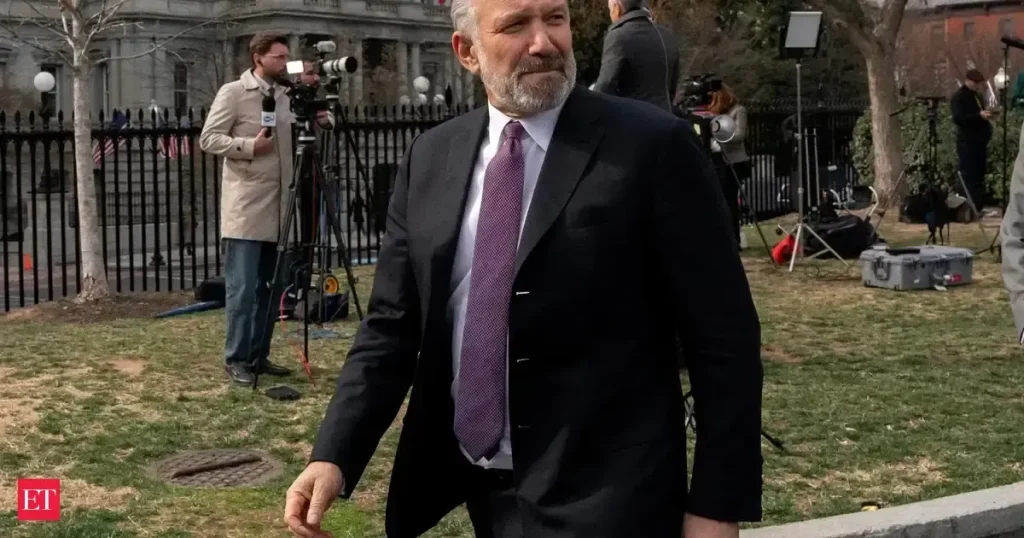Pharmaceutical tariffs have emerged as a significant topic of discussion in the realm of drug manufacturing, particularly among major players like Eli Lilly. As national security becomes a focal point for government policies, the implications of these tariffs on the availability of essential medications have raised eyebrows. Eli Lilly CEO Dave Ricks has expressed a willingness to aid in addressing these concerns, especially considering the potential impact on access to cheaper drugs. With a substantial portion of the medications in the U.S. being generic drugs, the fear is that tariffs could lead to drug shortages, exacerbating an already delicate situation. As the dialogue around pharmaceutical tariffs continues, it’s critical to assess how these economic measures might reshape the landscape of healthcare accessibility and national security.
In light of the current discourse, tariffs specific to the pharmaceutical industry have sparked critical dialogue concerning the broader implications for drug production and national integrity. As discussions unfold regarding the imposition of duties on imported pharmaceuticals, stakeholders are increasingly aware of the potential ripple effects on the supply chain of vital medications. Leaders in the pharmaceutical sector, such as Eli Lilly, are stepping up to provide insights on how these tariffs could affect the domestic marketplace while potentially hindering the manufacturing of indispensable drugs. Furthermore, as the focus shifts to ensuring the stability of drug availability, the role of generic medications in the larger ecosystem cannot be understated. Addressing these challenges effectively requires a collaborative approach, weighing the need for national security against the essential nature of affordable healthcare.
Understanding Pharmaceutical Tariffs and Their Implications
Pharmaceutical tariffs, triggered by national security concerns, have become a critical point of discussion among industry leaders. These tariffs are positioned as a means to protect the domestic market while ensuring that essential medicines remain available and affordable. In recent statements, Eli Lilly’s CEO, Dave Ricks, pointed out, the anticipated implementation of these tariffs could have far-reaching consequences on drug availability, particularly for older generic drugs that are vital for patient care.
As the pharmaceutical industry grapples with potential tariffs, the focus intensifies on how these measures could impact the prices of crucial medications. The investigation initiated by the Trump administration examines the effects of drug imports on national security, hinting at a future where tariffs might be used to shield U.S. pharmaceutical manufacturing. However, industry experts warn that such tariffs may inadvertently exacerbate existing drug shortages by discouraging manufacturers from competing in the U.S. market.
Eli Lilly’s Role in Strengthening Drug Manufacturing
Eli Lilly has increasingly positioned itself as a pivotal player in bolstering domestic drug manufacturing capabilities. With plans to invest $27 billion in establishing new production facilities across the United States, the company’s commitment emphasizes a strategic shift toward localized production. Ricks articulated this initiative as a proactive measure to confront potential drug shortages exacerbated by tariffs and import restrictions.
The investment in domestic manufacturing not only aims to meet current public health needs but also addresses long-term sustainability within the pharmaceutical supply chain. By producing essential drugs locally, Eli Lilly intends to mitigate the risks associated with dependency on foreign manufacturing, especially during crises. This move is geared towards reinforcing national security by ensuring a steady supply of critical medications.
The Risks of Tariffs on Generic Drugs
Generic drugs account for a substantial portion of the medications prescribed in the U.S., with approximately 90% of these drugs being essential for hospital care. However, the looming threat of tariffs specifically targeting generic drugs has raised significant concerns among health experts. There is a prevailing fear that such tariffs could drive manufacturers out of the U.S. market, leading to increased prices and further jeopardizing the availability of necessary medications.
The implications of tariffs on generic drugs could be detrimental, particularly as these drugs often serve as the cost-effective alternatives to brand-name pharmaceuticals. The backlash from health professionals suggests that instead of protecting national interests, imposing tariffs may create barriers to accessibility, complicating care for patients who rely on these affordably priced medications. It raises the urgent question: how can the government balance national security with the public’s right to affordable healthcare?
Investments in U.S. Pharmaceutical Manufacturing
Eli Lilly’s strategy of investing heavily in U.S. manufacturing reflects an ongoing trend within the pharmaceutical industry to prioritize local production. With the planned establishment of four new production facilities, the company is poised to enhance its supply capabilities while responding to growing national security concerns regarding the reliance on foreign drug manufacturing. This commitment aligns with the broader industry movement to re-localize production and reinvest in domestic capabilities.
These substantial investments are not merely about expanding production; they also signify a strategic shift towards ensuring that crucial drugs remain within reach for American consumers. By creating jobs and stimulating the economy through domestic manufacturing, Eli Lilly aims to reaffirm its dedication to meeting present and future healthcare challenges while curbing the potential disruptions that tariff implementations might cause.
National Security Concerns and Drug Availability
The intersection of national security and drug availability has created a complex landscape for pharmaceutical companies. With heightened scrutiny from governmental bodies, the importance of ensuring a consistent supply of essential medications has returned to the forefront. Dave Ricks has voiced Eli Lilly’s willingness to engage with officials on how best to navigate these concerns, reflecting a proactive approach to maintaining stability in drug supplies.
This dialogue underscores the necessity of developing sound policies that consider both national security imperatives and the uninterrupted access to affordable medications. As manufacturers like Eli Lilly advocate for practical solutions, the emphasis remains on finding a balance that safeguards public health without introducing punitive tariffs that could undermine accessibility.
The Future of Generic Drug Manufacturing
The potential impact of tariffs on the future of generic drug manufacturing is a topic of significant debate. With the U.S. generating a large percentage of its prescribed medications as generics, disruptions in this sector could have ripple effects across healthcare systems. As Eli Lilly navigates this uncertain landscape, the company’s investments could play a vital role in reshaping the future of drug availability.
Efforts to bolster the production of generics domestically are crucial as the market faces shifts stemming from potential tariff implementations. The question remains how to sustain the robust generation of affordable drugs while mitigating the risk of manufacturers exiting the U.S. market. A focus on innovation and incentive structures will be essential in developing a resilient framework for future generic drug manufacturing.
Engagement with National Security Officials
In light of the ongoing discussions regarding tariffs and drug consolidation, Eli Lilly’s leadership has expressed a genuine willingness to engage with national security officials. This dialogue is essential for addressing concerns effectively and fostering a collaborative environment between the pharmaceutical industry and the government.
Dave Ricks’ commitment to working alongside policymakers illustrates the proactive stance pharmaceutical companies must take to ensure that national security interests and public health considerations align. Such engagement could provide pathways to solutions that enhance both security and the availability of essential medications without stifling the market that provides them.
Challenges and Opportunities in the Pharmaceutical Sector
As the pharmaceutical sector anticipates the ramifications of potential tariffs, it stands at the crossroads of significant challenges and opportunities. Companies like Eli Lilly are not only assessing the financial impacts but also exploring how these shifts may ultimately reshape the landscape of drug manufacturing and supply chains.
Navigating these challenges requires innovative thinking and collaboration across the pharmaceutical ecosystem. By leveraging insights gained from potential tariff impacts, pharmaceutical companies can identify new opportunities for enhancing domestic production capacity, fostering partnerships, and ultimately ensuring the delivery of critical medications to those in need.
Balancing Costs with Healthcare Demands
In navigating the complexities of drug pricing in the face of potential tariffs, companies must also consider the growing demand for more affordable healthcare solutions. The balance between manufacturing costs and the need for cheap essential medicines is a delicate one, and Eli Lilly’s strategies moving forward will reflect this urgency.
A consensus among industry leaders like Ricks is that while addressing national security concerns is essential, tariffs should not come at the expense of patients’ access to necessary medications. Going forward, a collaborative framework will be required to ensure that drug pricing structures remain viable in an evolving healthcare landscape.
Frequently Asked Questions
What impact could pharmaceutical tariffs have on drug manufacturing in the U.S.?
Pharmaceutical tariffs may impact drug manufacturing by potentially increasing production costs for companies operating in the U.S. This could lead to higher prices for consumers and create tensions over the availability of essential medications. Additionally, if tariffs are imposed on imported drugs, it might encourage companies like Eli Lilly to expand domestic production, helping address national security concerns linked to drug shortages.
How do pharmaceutical tariffs relate to generic drugs and drug shortages?
Pharmaceutical tariffs could exacerbate drug shortages, particularly for generic drugs, which constitute about 90% of prescriptions in the U.S. If tariffs increase costs for manufacturers, some might exit the market, further limiting access to critical medications, particularly essential generics. Therefore, any tariff policy should carefully consider its potential effects on the availability of these vital drugs.
What is Eli Lilly’s position on potential pharmaceutical tariffs?
Eli Lilly’s CEO, Dave Ricks, has expressed concerns about the possible negative effects of pharmaceutical tariffs but is open to discussions with the administration regarding national security issues related to essential medicines. Ricks has pointed out that while the company is investing heavily in U.S. manufacturing, the imposition of tariffs might not be the most effective solution to address the availability of cheaper essential medicines.
How are national security and pharmaceutical tariffs connected?
National security and pharmaceutical tariffs are connected through the concern over the reliance on imported drugs, which could jeopardize access to essential medicines during crises. The Trump administration’s investigation into the impacts of drug imports on national security aims to determine if tariffs could help restore local manufacturing capabilities, reducing dependency on foreign suppliers.
What steps is Eli Lilly taking to bolster domestic drug manufacturing in light of tariffs?
Eli Lilly plans to invest at least $27 billion in establishing four new production facilities in the U.S. This investment is part of a strategy to strengthen domestic manufacturing capabilities in response to potential pharmaceutical tariffs and the broader aim of addressing national security concerns related to drug availability.
| Key Points | Details |
|---|---|
| Pharmaceutical Tariffs | Potential tariffs are expected as a result of the Section 232 investigation initiated by the Trump administration. |
| National Security Concerns | Eli Lilly’s CEO supports addressing national security concerns regarding the availability of essential medicines. |
| Eli Lilly’s Position | The company is willing to assist in revitalizing the manufacturing of essential medicines in the U.S. |
| Impact of Tariffs on Manufacturing | Experts warn that tariffs might push manufacturers out of the U.S. market, worsening shortages of critical medications. |
| Investment in U.S. Manufacturing | Eli Lilly plans to invest at least $27 billion into new U.S. production facilities. |
| Tax Incentives | Ricks advocates for permanent tax reductions for domestic production to keep drug manufacturers in the U.S. |
| Overall Industry Outlook | Despite uncertainties, the pharmaceutical industry is showing increased investment and a shift towards localized production. |
Summary
Pharmaceutical tariffs are becoming a topic of significant discussion as they relate to national security and the availability of essential medicines in the U.S. Eli Lilly’s CEO Dave Ricks has expressed the company’s willingness to assist in reinstating U.S.-based manufacturing for generic drugs. While potential tariffs could address some concerns, health experts worry about their adverse effects on the market and medication availability. The ongoing investments by pharmaceutical companies in local production facilities indicate a proactive approach to ensuring access to vital medicines, marking a complex landscape that requires careful navigation by the industry.

